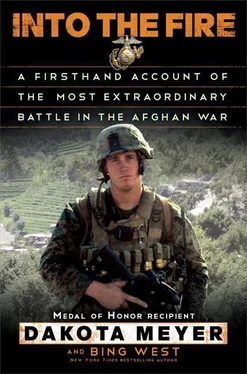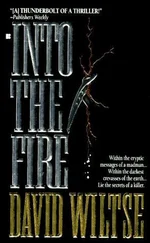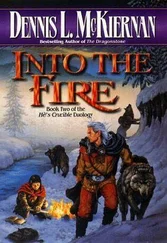I picked up four or five dead from the gang I’d kidded around with at Monti. I tried to place the wounded on top of the dead in the Afghan trucks, but sometimes I didn’t have time to do it properly—the PKM fire persisted. I was amazed how much ammo the enemy had stored in the hills.
At one point, two F-15s roared low through the valley, opening their afterburners to create a hell of a lion’s roar. The pilots wouldn’t drop any bombs. They were concerned we didn’t know where my missing team was, and didn’t agree with Swenson’s request that they drop their ordnance near the machine guns up on the ridgelines. ‘Bye.
An air controller with the Army scout-sniper team, Shadow 4, on the south ridge kept two to four Kiowas with Hellfire missiles hovering on standby waiting their turn to enter the valley. Shadow, angry that fire missions kept getting denied, also fended off the endless questions from the TOC at Joyce.
At one point, I heard Swenson let out a sarcastic laugh.
“Shadow 4, ask the TOC,” he radioed, “what will they fucking give me?”
By 1030, the enemy fire from the ridges had slackened considerably. The pilots knew my team wasn’t located in any hillside cave, so they concentrated their rocket and gun runs on the higher elevations. An Apache helicopter, with greater firepower than a Kiowa, came on station for a while. Fabayo tried to direct it, but lacking a GPS, he could only radio that the enemy were “everywhere.” The Apache ran low on fuel before it could acquire targets.
The pilots wouldn’t shoot blindly, though, at the terraces and compounds on the valley floor. When they saw a wounded Askar out in the terraces, they would say “Spot” over the radio as they flew over the body to guide us to the spot.
Inside the villages, the Army pilots ran astonishing risks to find my team. A Kiowa would swoop down toward the compounds, flare back at rooftop level, and putter down the alleyways at twenty miles an hour, allowing the pilots to peer into every backyard and into every window. Bearded and unarmed dushmen, close enough to see the sweat on their faces, glared back through the windows. After a Kiowa crept past, the dushmen shot at it from the rear. Not knowing which house my team was in, the pilots didn’t return fire. There weren’t any civilians wandering around. That day, the people of Ganjigal reverted to the traditional Pashtun way—they were fighting the outsiders. Five hours into the battle, no one was out for a stroll to check on the growth of the wheat.
As the day grew hotter, we gradually cleared the valley of casualties. Over thirty wounded or dead were evacuated. Driving around, we encountered less fire. When we finally pulled within a few hundred meters of the Ganjigal hamlets, I saw small knots of Askars from Monti tucked into defensive positions. They had conserved their ammunition, held their ground, and five hours into the battle, continued to skirmish with the dushmen. Great fire discipline.
My team had to be nearby. The Kiowas were bobbing up and down, skittering out of the way of small-arms bursts from windows.
I saw something blinking and glinting among the houses midway up the northern slope.
“A signal mirror!” I said. “We’ve found them!”
“We have a signal,” Swenson radioed to the pilots. “At our ten o’clock, the sixth, no, the seventh terrace up. The window to the left of the large rusty compound door.”
Like a darting hawk, a Kiowa flared upward, peeled to the left, and swooped down, hovering alongside the compound.
“Negative,” the pilot said. “It’s a shiny cooking pot hanging on a clothesline.”
A few minutes later, Staff Sgt. Valadez, in the north observation perch, spotted an orange panel on the roof of a compound on the south side of the wash.
Pale Horse darted over in his Kiowa.
“Negative,” Silano radioed to us. “It’s an ice cooler.”
Rod eased the truck up to the top of a crest to get a better look around. We were worn down and testy with each other. The day had gone on for a few months. In the turret, Fabayo was firing in two-round bursts.
“Vary the rate,” I snapped at him. We didn’t need another jammed gun.
“Shut up!” he yelled, kicking at my head. “I’m a lieutenant and you’re a corporal. Don’t tell me what to do.”
“I’m telling you,” I said, “the gun will jam if you keep that up. What will your dumb ass do then?”
It was no more personal than one lineman yelling at another in the heat of a football game.
Where are they? Where is my team?
“Why are we sitting here, doing nothing?” I yelled at Swenson.
“We’re waiting for reinforcements,” Swenson said.
“That’s bullshit!” I said. “The Army’s not coming. They haven’t come all day and you know it.”
We had reached our snapping points, physically worn down and mentally fatigued from constantly reading the maps, figuring out and calling ten-digit grid coordinates to one set of pilots after another, trying to come up with a search pattern for combing a hundred terraces. Emotionally, we were tapped out—a captain, a lieutenant, and a corporal squabbling, with no idea where our four lost brothers were and furious that we were out there on our own, treated over the radio from the TOC at Joyce as if we were a nuisance.
With two Kiowas constantly buzzing overhead, the enemy fire had decreased. I thought it was time to move into the damn village. Swenson was silent for a moment.
“All right,” he said, “we’ll move up. You sit tight.”
We hadn’t gone far when we saw another wounded Afghan off to our left. I got out to get him when a PKM dialed in on me. Seeing that I was pinned down, Pale Horse came to my rescue, making repeated strafing runs until the enemy fire stopped. I got the wounded man into an Afghan truck and ran back to our truck.
The TOC had known for hours that my team was missing. That key information had finally trickled up the chain of command. How could it not, since every helicopter entering the valley was searching for the team? Eventually the word reached a three-star general hundreds of miles away. This prompted a declaration of “personal recovery” or DUSTWUN (duty status whereabouts unknown). The Special Operations Command responded immediately by dispatching Apache attack helicopters and Air Force helicopters with para-rescue jumpers, or PJs—an elite force of tough commandoes.
By eleven in the morning, helicopters were swooping in low from different directions. A big Blackhawk was hovering low to the ground to our right front. The pilots thought they had located my team and were trying to land an Air Force para-rescue team. After an orange smoke grenade was pitched out to mark the spot, PKM fire narrowly missed the chopper. To avoid being shot down, it swung away without landing anyone. The pilot tried from another angle with the same result.
“Highlander, this is Pale Horse. That smoke is attracting too much incoming. I’ll mark the spot by hovering above it.”
Our Humvee was idling in the wash. Fabayo was firing at the south ridge, where a PKM was still shooting at some Askars. There were only a dozen compounds on the knob of South Ganjigal off to our right, with small terraces spread out like a fan in front of the compounds.
Maybe, I thought, the team retreated back into the houses. “I’m going to search those compounds,” I said.
“Stay buttoned up,” Swenson said.
“They’re my team,” I said, “and I’m going to find them, not sit here wasting time.”
“I’m an Army captain, Corporal,” Swenson said. “I’m giving you a direct order. Stay in the damn truck. We’re all here to find them. It’s not just you.”
Читать дальше












